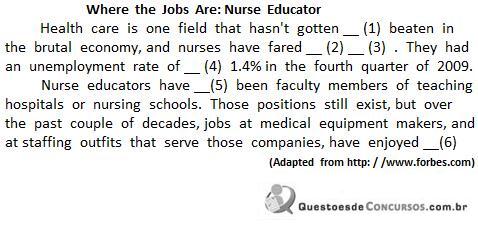Questões Militares
Sobre advérbios e conjunções | adverbs and conjunctions em inglês
Foram encontradas 157 questões
Religion ________ central to people's lives in Africa. Although the majority of Africans are now Muslim or Christian, traditional religions have endured and still play a big role. Religion runs like a thread through daily life, marked by prayers of gratitude in times of plenty and prayers of supplication in times of need. Religion confirms identity on the individual and the group.
http://www.bbc.co.uk/worldservice/africa/features/storyofafrica
GLOSSARY:
Endure – to continue to exist for a long time
Thread – one part connecting with another
As expressões em NEGRITO nas orações a seguir, extraídas do primeiro parágrafo,
I. …even though it did not improve traffic flow as much as hoped.
II. …but nonetheless significant change in the city’s infrastructure,…
podem ser substituídas, respectivamente, por
Instrução: Leia o artigo 11 da Declaração Universal dos Direitos Humanos, em inglês, para responder a questão, assinalando a alternativa que completa corretamente as respectivas lacunas.
The Universal Declaration of Human Rights
Article 11
(1) Everyone charged with a penal offence has the right to be presumed innocent —— 71 proved guilty according to law in a public trial at which he —— 72 all the guarantees necessary for his defence.
(2) No one shall be held guilty of any penal offence on account of any act or omission — 73 — did not constitute a penal offence, under national or international law, at the time when it was committed. Nor shall a heavier penalty be imposed than the one that was applicable at the time the penal offence was committed.
(www.un.org. Adaptado.)
This credit card is__________ accepted.
To get from Salvador to Morro de São Paulo you can fly, ____________you can ride the ferry.

Leia o seguinte período extraído do texto:
Vegetarian restaurants have lower overheads since they don’t need freezers, says Marisa Ledesma, one of the owners of Bio Restaurante, a smart eatery. (parágrafo 2).
Assinale a opção que pode substituir o termo since sem que o sentido da oração seja comprometido.
TEXT III
A new Aviation English Test Speaks of Pilots’ voices and aviation safety
In addition ___(1) the development ___(2) various tests ___(3) response ___(4) the ICAO’s language proficiency requirement, a new test has been designed using flight simulators, ___(5) consideration of both the test takers and the ICAO’s fundamental focus ___(6) aviation safety. The test provides a familiar and work-related testing environment ___ (7) pilots, an efficient and cost-effective test system ___(8) airlines, and international credibility and valid evaluation tools to states, while fully covering both aviation and plain English Assessment needs.
(Jason Park and Tyler Kong ALTEON Training Asia LLC Seoul, Korea.)
TEXT II
LANGUAGE TEACHING
Languages are taught and learned in various places, some in informal settings, others in formal contexts, such as classrooms. It is common knowledge that regardless of the method used, second language learners achieve mastery of the target language to varying degrees. Although 10 individuals may be in the same language class for a year, their eventual proficiency level and profile will be different from one another. This is the result of a combination of the factors briefly mentioned above, compounded with the pedagogical methods that the learner has encountered. Generally speaking, it can be stated that most individuals learn to communicate basic information through a conversation in the target language in the first few years of active language study (provided that there are opportunities to use the language to create personal meaning). It is important to note that mere exposure or contact with the target language in most cases is not sufficient to result in productive language skills.
(http://www.aeservices.net/English/newsletters/Oct2007.html#B2)








